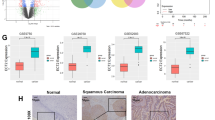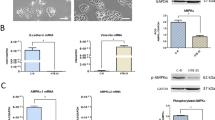Abstract
Earlier, we reported an association of A-kinase anchor protein 4 (AKAP4) expression in cervical cancer patient specimens, indicating its implications as an immunotherapeutic target. In this study, we investigated the possible role of AKAP4 in cervical carcinogenesis. AKAP4 messenger RNA and protein expression was assessed in four cervical cancer cell line models, C-33A, CaSki, HeLa and SiHa. Gene silencing approach was employed to investigate the potential role of AKAP4 in cellular growth, proliferation, colony-forming ability, migration and invasion in aggressive squamous cell carcinoma cells (SiHa). Further, the effect of downregulation of AKAP4 on tumor growth was examined in the cervical cancer xenograft model in nude mice. Our data clearly indicated that AKAP4 was expressed in all cervical cancer cells at the gene and protein level. We also observed distinct cytoplasmic and surface localization by indirect immunofluorescence and flow cytometry, respectively. Ablation of AKAP4 protein caused significant inhibition in cellular proliferation, colony-forming ability, migration and invasion ability of SiHa cells. Further, gene silencing of AKAP4 also resulted in reduced tumor growth in nude mice in vivo. Collectively, AKAP4 surface localization and its significant association with malignant properties of cervical cancer cells imply its clinical utility as an immunotherapeutic target.
This is a preview of subscription content, access via your institution
Access options
Subscribe to this journal
Receive 12 print issues and online access
$259.00 per year
only $21.58 per issue
Buy this article
- Purchase on Springer Link
- Instant access to full article PDF
Prices may be subject to local taxes which are calculated during checkout





Similar content being viewed by others
References
Siegel R, Naishadham D, Jemal A . Cancer statistics, 2013. CA Cancer J Clin 2013; 63: 11–30.
Arbyn M, Castellsagué X, de Sanjosé S, Bruni L, Saraiya M, Bray F et al. Worldwide burden of cervical cancer in 2008. Ann Oncol 2011; 22: 2675–2686.
Singh S, Badaya S . Factors influencing uptake of cervical cancer screening among women in india: a hospital based pilot study. J Community Med Health 2012; 2: 157.
Mehlen P, Puisieux A . Metastasis: a question of life or death. Nat Rev Cancer 2006; 6: 449–458.
Hanahan D, Weinberg RA . Hallmarks of cancer: the next generation. Cell 2011; 144: 646–674.
Chambers AF, Groom AC, MacDonald IC . Dissemination and growth of cancer cells in metastatic sites. Nat Rev Cancer 2002; 2: 563–572.
Fidler IJ . The pathogenesis of cancer metastasis: the ‘seed and soil’ hypothesis revisited. Nat Rev Cancer 2003; 3: 453–458.
Suri A, Saini S, Sinha A, Agarwal S, Verma A, Parashar D et al. Cancer testis antigens: A new paradigm for cancer therapy. Oncoimmunology 2011; 1: 1194–1196.
Agarwal S, Saini S, Parashar D, Verma A, Jagadish N, Batra A et al. Expression and Humoral response of A-Kinase Anchor Protein 4 (AKAP4) in Cervical Cancer. Int J Gynecol Cancer 2013; 23: 650–658.
Chiriva-Internati M, Raffaele F, Yu Y, Hamrick C, Gagliano N, Grizzi F et al. AKAP4: a novel cancer testis antigen for multiple myeloma. Br J Haematol 2008; 140: 464–474.
Chiriva-Internati M, Yu Y, Mirandola L . D' Cunha N, Hardwicke F, Cannon MJ et al. Identification of AKAP4 as a new cancer/testis antigen for detection and immunotherapy of prostate cancer. Prostate 2012; 72: 12–23.
Saini S, Jagadish N, Bhatnagar A, Gupta A, Suri A . A novel cancer testis antigen, A-kinase anchor protein 4 (AKAP4) is a potential biomarker for breast cancer. PLoS ONE 2013; 8: e57095.
Agarwal S, Saini S, Parashar D, Verma A, Sinha A, Jagadish N et al. A novel cancer testis antigen, A-kinase anchor protein 4 (AKAP4) is a potential target for immunotherapy of ovarian serous carcinoma. Oncoimmunology 2013; 2 4: eLocation ID e24270.
Bozzuto G, Ruggieri P, Molinari A . Molecular aspects of tumor cell migration and invasion. Ann Ist Super Sanità 2010; 46: 66–80.
Semizarov D, Frost L, Sarthy A, Kroeger P, Halbert DN, Fesik SW . Specificity of short interfering RNA determined through gene expression signatures. Proc Natl Acad Sci USA 2003; 100: 6347–6352.
Sarcevic B, Spagnoli GC, Terracciano L, Schultz-Thater E, Heberer M, Gamulin M et al. Expression of cancer/testis tumor associated antigens in cervical squamous cell carcinoma. Oncology 2003; 64: 443–449.
Chang HK, Park JW, Kim W, Kim K, Lee M, Park U et al. The expression of MAGE and GAGE genes in uterine cervical carcinoma of Korea by RT-PCR with common primers. Gynecol Oncol 2005; 97: 342–347.
Park S, Lim Y, Lee D, Cho B, Bang YJ, Sung S et al2003 Identification and characterization of a novel cancer/testis antigen gene CAGE-1. Biochem Biophys Acta 2003; 1625 173–182.
Hayashi E, Matsuzaki Y, Hasegawa G, Yaguchi T, Kurihara S, Fujita T et al. Identification of a novel cancer-testis antigen CRT2 frequently expressed in various cancers using representational differential analysis. Clin Cancer Res 2007; 13: 6267–6274.
Hasegawa K, Koizumi F, Noguchi Y, Hongo A, Mizutani Y, Kodama J et al. SSX expression in gynecological cancers and antibody response in patients. Cancer Immun 2004; 4: 1–4.
Napoletano C, Bellati F, Tarquini E, Tomao F, Taurino F, Spagnoli G et al. MAGE-A and NY-ESO-1 expression in cervical cancer: prognostic factors and effects of chemotherapy. Am J Obstet Gynecol 2008; 198 99: e7.
Garg M, Kanojia D, Salhan S, Suri S, Gupta A, Lohiya NK et al. Sperm-associated antigen 9 is a biomarker for early cervical carcinoma. Cancer 2009; 115: 2671–2683.
Garg M, Kanojia D, Suri S, Suri A . Small interfering RNA-mediated down-regulation of SPAG9 inhibits cervical tumor growth. Cancer 2009; 115: 5688–5699.
Garg M, Kanojia D, Saini S, Suri S, Gupta A, Surolia A et al. Germ cell-specific heat shock protein 70-2 is expressed in cervical carcinoma and is involved in the growth, migration, and invasion of cervical cells. Cancer 2010; 116: 3785–3796.
Mohapatra B, Verma S, Shankar S, Suri A . Molecular cloning of human testis mRNA specifically expressed in haploid germ cells, having structural homology with the A-kinase anchoring proteins. Biochem Biophys Res Commun 1998; 244: 540–545.
Mirandola L, Yu Y, Jenkins MR, Chiaramonte R, Cobos E, John CM et al. Tracking human multiple myeloma xenografts in NOD-Rag-1/IL-2 receptor gamma chain-null mice with the novel biomarker AKAP-4. BMC Cancer 2011; 11: 394.
Carnegie GK, Means CK, Scott JD . A-kinase anchoring proteins: from protein complexes to physiology. IUBMB Life 2009; 61: 394–406.
Oh Jm, Kim SH, Yi Lee, Seo M, Kim SY, Song YS et al. Human papillomavirus E5 protein induces expression of the EP4 subtype of prostaglandin E2 receptor in cyclic AMP response element-dependent pathways in cervical cancer cells. Carcinogenesis 2009; 30: 141–149.
Acknowledgements
We thank Dr Nicholas Denko, Stanford University School of Medicine, Stanford, CA, USA, for gifting cervical cancer cell lines. We also thank technical support by Mrs Rekha Rani, National Institute of Immunology, New Delhi, India, for confocal microscopy. This work is supported by grants from Indo-UK Cancer Research Program, Centre for Molecular Medicine, NII-core funding, Department of Biotechnology, Government of India.
Author information
Authors and Affiliations
Corresponding author
Ethics declarations
Competing interests
The authors declare no conflict of interest.
Rights and permissions
About this article
Cite this article
Saini, S., Agarwal, S., Sinha, A. et al. Gene silencing of A-kinase anchor protein 4 inhibits cervical cancer growth in vitro and in vivo. Cancer Gene Ther 20, 413–420 (2013). https://doi.org/10.1038/cgt.2013.32
Received:
Revised:
Accepted:
Published:
Issue Date:
DOI: https://doi.org/10.1038/cgt.2013.32
Keywords
This article is cited by
-
High AKAP8L expression predicts poor prognosis in esophageal squamous cell carcinoma
Cancer Cell International (2022)
-
Targeted biologic inhibition of both tumor cell-intrinsic and intercellular CLPTM1L/CRR9-mediated chemotherapeutic drug resistance
npj Precision Oncology (2021)
-
Circular RNA UBAP2 contributes to tumor growth and metastasis of cervical cancer via modulating miR-361-3p/SOX4 axis
Cancer Cell International (2020)
-
Loss of MADD expression inhibits cellular growth and metastasis in anaplastic thyroid cancer
Cell Death & Disease (2019)
-
A-kinase anchor protein 4 (AKAP4) a promising therapeutic target of colorectal cancer
Journal of Experimental & Clinical Cancer Research (2015)



